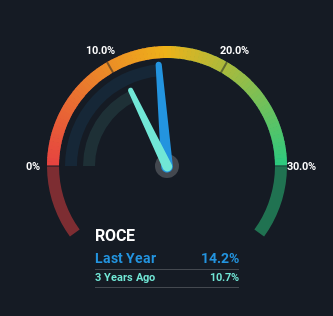Investors Will Want Corus Entertainment's (TSE:CJR.B) Growth In ROCE To Persist
If you're looking for a multi-bagger, there's a few things to keep an eye out for. Firstly, we'd want to identify a growing return on capital employed (ROCE) and then alongside that, an ever-increasing base of capital employed. This shows us that it's a compounding machine, able to continually reinvest its earnings back into the business and generate higher returns. Speaking of which, we noticed some great changes in Corus Entertainment's (TSE:CJR.B) returns on capital, so let's have a look.
Return On Capital Employed (ROCE): What Is It?
Just to clarify if you're unsure, ROCE is a metric for evaluating how much pre-tax income (in percentage terms) a company earns on the capital invested in its business. The formula for this calculation on Corus Entertainment is:
Return on Capital Employed = Earnings Before Interest and Tax (EBIT) ÷ (Total Assets - Current Liabilities)
0.14 = CA$144m ÷ (CA$1.5b - CA$538m) (Based on the trailing twelve months to November 2024).
So, Corus Entertainment has an ROCE of 14%. In absolute terms, that's a satisfactory return, but compared to the Media industry average of 9.9% it's much better.
See our latest analysis for Corus Entertainment

Above you can see how the current ROCE for Corus Entertainment compares to its prior returns on capital, but there's only so much you can tell from the past. If you'd like to see what analysts are forecasting going forward, you should check out our free analyst report for Corus Entertainment .
What The Trend Of ROCE Can Tell Us
You'd find it hard not to be impressed with the ROCE trend at Corus Entertainment. The data shows that returns on capital have increased by 30% over the trailing five years. That's a very favorable trend because this means that the company is earning more per dollar of capital that's being employed. Speaking of capital employed, the company is actually utilizing 77% less than it was five years ago, which can be indicative of a business that's improving its efficiency. Corus Entertainment may be selling some assets so it's worth investigating if the business has plans for future investments to increase returns further still.
For the record though, there was a noticeable increase in the company's current liabilities over the period, so we would attribute some of the ROCE growth to that. Effectively this means that suppliers or short-term creditors are now funding 35% of the business, which is more than it was five years ago. Keep an eye out for future increases because when the ratio of current liabilities to total assets gets particularly high, this can introduce some new risks for the business.
Our Take On Corus Entertainment's ROCE
In the end, Corus Entertainment has proven it's capital allocation skills are good with those higher returns from less amount of capital. And since the stock has dived 98% over the last five years, there may be other factors affecting the company's prospects. Regardless, we think the underlying fundamentals warrant this stock for further investigation.
If you want to know some of the risks facing Corus Entertainment we've found 3 warning signs (2 are potentially serious!) that you should be aware of before investing here.
While Corus Entertainment may not currently earn the highest returns, we've compiled a list of companies that currently earn more than 25% return on equity. Check out this free list here.
New: AI Stock Screener & Alerts
Our new AI Stock Screener scans the market every day to uncover opportunities.
• Dividend Powerhouses (3%+ Yield)
• Undervalued Small Caps with Insider Buying
• High growth Tech and AI Companies
Or build your own from over 50 metrics.
Have feedback on this article? Concerned about the content? Get in touch with us directly. Alternatively, email editorial-team (at) simplywallst.com.
This article by Simply Wall St is general in nature. We provide commentary based on historical data and analyst forecasts only using an unbiased methodology and our articles are not intended to be financial advice. It does not constitute a recommendation to buy or sell any stock, and does not take account of your objectives, or your financial situation. We aim to bring you long-term focused analysis driven by fundamental data. Note that our analysis may not factor in the latest price-sensitive company announcements or qualitative material. Simply Wall St has no position in any stocks mentioned.
About TSX:CJR.B
Corus Entertainment
A media and content company, operates specialty and conventional television networks, and radio stations in Canada and internationally.
Undervalued with low risk.
Similar Companies
Market Insights
Community Narratives



